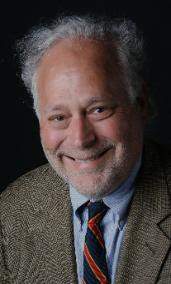
Dan Sklar has been described as an “American Primitive” by other poets in the region. And they mean this as a compliment. Sklar is a PhD and a professor of Creative Writing at Endicott College and he writes with a no-frills and emotive style–that cuts to the chase and cuts the … well you know what. His latest book of poetry is titled Flying Cats: Actually Swooping ( Ibbetson Street Press). I talked with Sklar on my Somerville Community Access TV show Poet to Poet: Writer to Writer.

Poet Dan Sklar.
Doug Holder: You have won a number of awards for teaching excellence. I often hear you and your students screaming when I am in my office at Endicott College early in the morning. Is this is a good indicator of an engaged classroom?
Dan Sklar: ( Laughs) Well it depends on what you are teaching. But that particular course was play writing. And in that course we were doing scenes. So in scenes people are usually arguing and fighting–there is conflict. I think you should wake your students up. You wake up their minds. Talk to them like human beings. The first few minute of the class I always come in with a story. I also use dreams. When you talk about dreams suddenly everyone listens, because everyone dreams. You ask them about their dreams. I always bring in something that makes them listen.
DH: You are also a playwright. Recently you had a play staged at the Actor’s Studio in Newburyport, Mass. entitled Hack License. What was the play about?
DS: Well–it is about a woman taxi cab driver–22 years old, from Louisiana. And all these New Yorkers come into her cab. And they all come with their problems. And they insult her. But in spite of this she solves their problems. She is also looking for a man. He has to paint like Charles Burchfield. Burchfield was known for painting pictures with bright colors, storms, flowers, volcanoes vivid yellows, reds and greens.
DH: What playwrights have influenced you. Eugene O’Neill for instance?
DS:I wish I could write like Eugene O’Neill. Every time I start to write like him it comes out like Neil Simon. Saroyan is a big influence. George S. Kaufman, and Thornton Wilder are also.
DH: You use a lot of comedy in your writing.
DS: Yeah–but I never mean to. It just happens.
DH: Walt Whitman and Charles Bukowski are inspirations for you. Whitman seemed to embrace the world, while Bukowski was misanthropic. What appeals you about these divergent voices?
DS: I like Bukowski’s freedom. I am lusty as nature like Whitman. With Bukowski I like his sincerity and honesty. Bukowski has a poem that states that he has a bluebird in his heart that he tries to drown with whiskey. But the blue bird is still there. It is a beautiful poem. Whitman is full of love and contradictions. Like Whitman, I contradict myself, so I contradict myself. I am filled with contradictions. And Bukowski is filled with contradictions.
DH: Your new collection is Flying Cats: Actually Swooping ( Ibbetson Street Press). Where did you get the title from?
DS: I was watching a TV show about the future in which there were no humans on the planet. And I started to fall asleep but I heard: “In the future there will be flying cats. And I perked up. The show talked about how in the future when there are no humans the cats will go back into the trees and fly….actually swooping. So I wrote a poem about the future where cats will fly–people will ride horses–and take trains–life will be slower.
DH: You seem to be an eternal optimist. It must be hard to maintain.
DS: Yes. When I am with people it is not hard. Especially with students. I brood when I am alone. When I go to a coffee-shop by myself I get depressed. It is creative depression. And good writing comes from it. It’s like the Russians. A Russian has to suffer.
DH: Lisa Beatman, a well-respected poet, described you as an American Primitive.
DS: I like that label. When she says primitive I love it. It means basic, primal…there is nothing fancy about it. I take it as a compliment. I use very little metaphor in my poetry–if I come up with it, it is by pure chance.
DH: Like William Carlos Williams your poetry is about things.
DS: Oh. Absolutely. My last book with Ibbetson Street was Bicycles, Canoes and Drums–all primitive things. The future is going to go back to basics–like horse drawn carriages, etc….
DH: In your new collection you have a poem Poetry Mind — that deals with you trying to keep from becoming standardized. Do you think people today are thinking less outside the box?
DS: I don’t know what other people are thinking or doing. But I think folks should not be so enamored with technology. There are too many screens around. All of this is going way from nature. When you go away from nature–destroying it becomes less of a problem.















Reader Comments